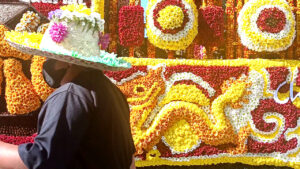Panagbenga 2024: Radiant in recovery

STREETS filled with flowery floats, colorfully dressed dancers, stalls of snack foods and landscaped gardens, and crowds of tourists in Baguio City mean only one thing — it is February, the time of Panagbenga Festival.
The annual flower festival, which takes its name from a Kankanaey word that translates to “a time of blossoming,” first started in 1995, five years after the city was devastated by an earthquake. Its emergence was a recovery effort.
Its 29th celebration this year, with the theme “Celebrating Tradition, Embracing Innovation,” has a similar motivation in the wake of the pandemic.
“The whole tourism industry has changed. We’re trying to rebuild and bring back tourists. There are much more [tourists] this year than the last, but it is still far from pre-pandemic [levels],” Frederico S. Alquiros, president of the Baguio Flower Festival Foundation, Inc. (BFFFI), told media visiting from Manila on Feb. 25.
In 2019, Baguio’s tourism office recorded about 1.5 million tourists. While there is no exact number yet for 2023, it is estimated to have breached the one-million mark.
“Panagbenga is our contribution to the tourism and promotion of the culture of Baguio, which includes cultures of the Cordillera region,” added Mr. Alquiros.
A milestone that the city reached at this year’s festival was the most participating flower floats: 33.
Mauricio G. Domogan, an ex-mayor of Baguio and chairman emeritus of BFFFI, clarified that the festival has always focused on quality rather than quantity, despite the high number of participants this year.
“It’s not about winning for many of them. It’s about the spirit of participating,” he said.
Mr. Domogan explained that “inculcating a sense of pride for local cultures in the city’s youth” has been a major pillar of the festival, alongside sustaining the tourism industry. “When we started this in 1995, the P13- to P15-million business tax per annum jumped to P54 million that year,” he said.
It was crisp and sunny both on the morning of the Grand Street Parade on Feb. 24 and the morning of the Grand Float Parade on Feb. 25. While there were sizeable crowds watching along Session Road and near Burnham Park, the BFFFI heads said, “there could definitely be more.”
Tribu Rizal from Kalinga Province, decked in elaborate native attire and exuding infectious energy, won the Festival Dance category. Baguio City’s Lucban Elementary School, wowing the audience with creative music arrangements and colorful costumes, won the Drum and Lyre category.
Mr. Domogan told BusinessWorld about one year when it rained, and the foundation and city government planned to cancel the parade. “The children were crying because all the preparation meant so much them, and they really wanted to continue, so we did.”
The winning floats this year were Solid North’s intricate, floral bus-shaped float for the large float category, Chowking’s Chinese-style flower float won in the medium-sized float category, and Zaparita Garden’s beautifully executed garden-on-wheels creation won in the small float category.
When it comes to cleanliness and health policies throughout the festival, BFFFI maintained that they have been “very strict.”
The gastroenteritis outbreak reported in December led them to require all food and beverage stalls to use bottled water. Meanwhile, a cleaning brigade trails the end of each parade, to ensure no waste is left by participants or crowds.
“The flowers from the floats can either be donated to church altars after the festival or collected and made as compost for fertilizer,” Mr. Alquiros said.
The month-long festival will conclude with its final event, “Session in Bloom,” where the famed Session Road is closed to vehicles and filled with stalls and booths on March 3. The closing program will include a grand fireworks display. — Bronte H. Lacsamana




